Owning a Macaw: Insights into Care and Companionship


Intro
Owning a macaw offers a profound and rewarding experience. These birds are not just pets; they can become essential members of your family. Their vibrant colors and intelligent personalities make them immensely appealing. However, the privilege of sharing your life with a macaw comes with great responsibilities. This article aims to provide a detailed exploration of macaw ownership, delving into aspects like care, behavior, nutrition, and health, all of which are critical to fostering a thriving environment for these remarkable creatures.
Understanding a macaw’s needs and traits is vital for any owner. Ignorance can lead to issues that compromise the health of the bird or cause challenges within the household. By the end, readers will gain insights and tools necessary to provide a fulfilling life for their feathered companions, ensuring harmony and companionship.
This exploration will touch on daily care tips, the importance of recognizing behavioral insights, guidance on optimal nutrition, wellness checkups, and helpful activities to keep your macaw engaged.
Care Tips
Daily Care Routines
Owning a macaw requires consistent daily routines. Morning interactions are crucial since macaws thrive on social connection. Feed your macaw promptly after waking up, as they expect regularity.
Spend time talking, playing, or training in the morning and evening. Daily attention cannot be overstated, as these behaviors stimulate their minds and strengthen your bond. Each macaw has its unique needs; some may enjoy longer training sessions while others prefer quiet time in your company.
Cage Setup and Maintenance
Creating a proper habitat is essential. Use a large cage; macaws need space to move. Ideal dimensions allow for comfortable flight and digging. Make sure the cage is safe, using non-toxic materials and sturdy construction.
Clean the cage regularly to minimize bacteria and odor. Remove uneaten food after a few hours and change the water daily. Schedule thorough cleanings on a more extensive basis to maintain overall hygiene.
Hygiene and Cleaning Practices
Regular hygiene practices support the health of your macaw. Trim feathers and nails consistently, keeping safety in focus. Bathing is crucial; macaws need to splash in water, which can come from a shallow dish or through mist. Spot cleaning is essential; do it every day while a deep clean can be done weekly, involving scrubbing surfaces and possibly using bird-safe disinfectants.
Seasonal Care Adjustments
As seasons change, adapt the care plan. In colder months, consider additional lighting and isolation from cold drafts. During summer, ensure access to fresh air while providing shade. Keeping a close eye on the temperature and humidity will bolster your macaw's health.
”Macaws thrive in environments that mimic their natural habitat; the more you provide that, the happier they will be.”
Behavioral Insights
Understanding Bird Body Language
It is crucial for macaw owners to interpret body language correctly. Recognizing when a macaw feels relaxed, threatened, or anxious can prevent behavioral problems. Watch for movements, tail feather position, and vocalizations. These signs often reflect the mood of the bird. Engaging attention is equally important as balancing any signs of stress.
Common Behavioral Issues and Solutions
Addressing behavioral issues is crucial to happy ownership. Biting is often a popular concern. It usually arises from fear or stress. Gradually introducing new experiences can help ease anxiety. Consider training the bird regularly to reinforce positive behavior.
Common issues may also include excessive screaming or feather plucking. Diverse engagement and space for mental stimulation tend to offer solutions. Patience, observation, and correct management lead to positive behavioral adaptation.
Positive Reinforcement Techniques
Utilizing positive reinforcement is a successful training strategy. Reward activities mean effective conditioning. Offer treats or attention for preferred behaviors. This approach strengthens the relationship and offers your macaw the drive to learn and explore.
Social Interaction Needs
As social creatures, macaws demand socialization. These birds are prone to loneliness or boredom and will thrive when integrated into day-to-day activities. Allocate time for play and interactive environment sharing. Uncover how your macaw reacts to company or toys and adapt accordingly to avoid possible negative behaviors.
Nutrition Guides
Essential Diet Components
The diet of a macaw plays a vital role in overall health. High-quality pellets, along with a variety of fruits and vegetables, can maintain well-rounded nutrition. Look into mixes with seeds, nuts, nuts and legumes as conjunction foods. Safeguard that you provide a balance, adapting slowly when introducing new items to avoid stomach disturbances.
Safe and Toxic Foods
Knowledge of food safety cannot be overstated. Foods such as apples, bananas, carrots, and leafy greens are welcomed but be vigilant about items that pose dangers. Avoid chocolate, avocado, caffeine, or fatty foods. It is essential to perform research on safe lists as many common household items can harm.
Supplements and Treats
Suppplemnets are beneficial in many cases. They can bolster a macaw’s diet if there are deficiencies observed. Healthy treats like seeds or dried fruits can be an occasional reward. Overfeeding dangerous items might result in spoiled behaviours.
Feeding Strategies for Different Species
Keep various types of macaws in mind. Different species have distinct nutrient requirements. Consult with veterinarians or avian nutritionists for personalized dietary plans based on size, mood, and age.
Wellness and Health
Routine Health Checkups
Periodic veterinary checkups are critical for assessing overall wellness. Create a schedule based on the macaw's health status and any existing conditions. General routine care highlights blood testing, examination, and preventive measures.
Identifying Symptoms of Illness
Strive to stay alert to indications of illness. Regularly turn a gaze towards feathers, beak condition, and waste. Let symptoms such as decreased vocalization or lethargy raise your concern; any change should not go ignored. It is better to ask earlier instead of waiting for illness to escalate.
Preventative Care and Vaccinations
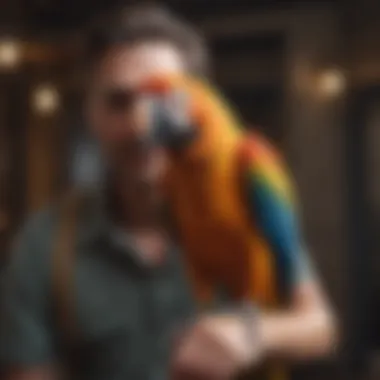
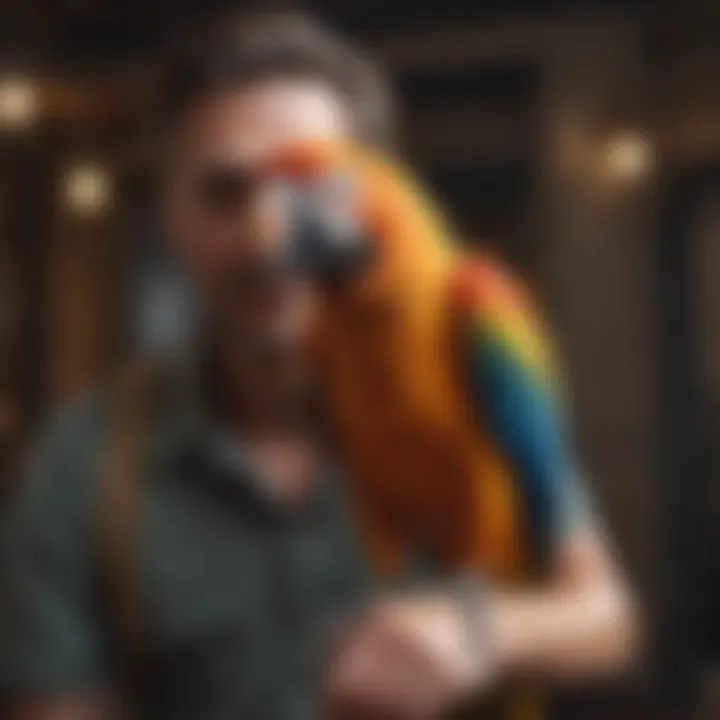
Being proactive with veterinary visits is vital. Based on the individual macaw, vaccination can prevent the spread of avian diseases. It is crucial for avoidance. Being on alert about wild trapped pets or suspicious forms can stem common affections.
Mental and Emotional Well-being
Mental health also matters, as macaws form attachments. Understanding their cues and reaching out plays a significant part of emotional needs. Bonding through relationships fosters significant longevity. Envrisonment matters greatly; provide them with entertaining toys and engagement likely benefits wellbeing.
Enriching Activities
Toys and Playtime Ideas
Daily playtime enriches the environment of macaws. Invest in sturdy and safe toys to keep them entertained. Chewing toys cater to beak health, while interactive toys help focus mental skills. Don’t underestimate the importance of rotating toys to keep excitement
Training and Tricks
Macaws are highly trainable creatures and rewarding efforts can lead to fun results. Various tricks like retrieval, “dance,” or other guided tasks form superb bonds. Creative ideas stimulate while utilizing techniques promotes mental fitness. Enrich your life, and it will reflect in wellness and mood.
Outdoor Activities and Interaction
Outdoor activities allow seasonal bonuses too. Takes small tightly fit carriers to transport safely or practice tying techniques in designated areas. Be mindful of loud sounds or airborne dangers—location should provide a breathable frame.
DIY Projects for Mental Stimulation
Craft your diovesrig for multiple mental stimuli. Think creatively like cardboard boxes or dangling items helpful for tipping training. Daily interactions similar to a social situation engage attention, assisting enrichment priorities.
This guide outlines critical comprehensions for creating fulfilling companionships with macaws. The challenges are notable, yet worth exploring through understanding and commitment. Building concordance between owner and bird leads not only to happy households but adds richness to daily days.
Preface to Macaws
Understanding macaws is paramount for anyone considering bringing one into their home. They are not merely pets; they are highly intelligent beings with unique needs and behaviors. Knowing more about macaws enables potential owners to appreciate their capabilities and responsibilities before deciding on ownership.
Macaws are admired both for their striking appearance and complex social behaviors. Each species has distinctive traits and heights in social structures that directly impact their interactions with humans. Familiarity with these factors leads to better care practices and a more fulfilling companionship.
Overview of Macaw Species
Macaws belong to several species within the family Psittacidae. Notably, the common macaw species include the Blue-and-yellow Macaw, Scarlet Macaw, and Green-winged Macaw. Each species showcases vibrant coloration and varying characteristics.
- Blue-and-yellow Macaw: Known for their bright blue feathers and swiftly adapted personalities. They are often easier to train.
- Scarlet Macaw: Recognized for their vibrant reds, yellows, and blues, they are intelligent and need more interaction with owners.
- Green-winged Macaw: This species combines beauty and gentle temperament, making them an appealing choice for families.
These different macaw species offer unique looks, temperaments, and interaction styles. Understanding which species suits your lifestyle is critical.
Why Choose a Macaw as a Pet?
Selecting a macaw as a pet comes with advantages that most might not consider. Here are some reasons:
- Intelligence: Macaws can learn various tricks and skills. Their intelligence challenges owners to keep them engaged.
- Sociability: They are among the most social birds. This trait allows them for strong bonding with their human companions.
- Longevity: Macaws can live up to 50 years or more. If you are prepared for long-term commitment, they make lifelong friends.
Owning a macaw is a commitment that can profoundly improve one's life. It is not only an education experience but also an opportunity to develop a unique friendship with a complex and talented creature.
"They are serious companions that bring both challenges and joys, making their presence in a household impactful and transformative."
From understanding their behavior to recognizing their needs, preparation is vital for nurtur6ng such dynamic pets.
Understanding Macaw Behavior
Understanding the behavior of macaws is essential not only for the well-being of the bird but also for fostering a meaningful relationship between the macaw and its owner. Macaws are complex creatures with intricate social needs. By recognizing their behavioral patterns, owners can ensure a harmonious living environment that meets the bird's emotional and social demands.
Social Nature and Communication
Macaws thrive in social settings, often forming strong bonds with their flock or human caregivers. Their natural inclination for interaction makes it vital to understand their communication style. Macaws employ vocalizations, body language, and even physical touch to express their feelings.
- Vocalizations: Loud calls are typical, but they also develop a range of sounds dedicated to specific meanings, making early exposure to their vocal repertoire beneficial. This aids owners in deciphering their macaw’s moods or needs.
- Body Language: Observing a macaw's posture offers insights into its emotional state. Raised feathers might indicate excitement, while a turned back could signal discomfort or fear. Learning these signals enhances the care and trust in the relationship.
- Physical Affection: Many macaws enjoy being handled or petted, which encourages bonding. Engaging them frequently builds trust.
In summary, understanding macaw communication is fundamental. It helps prevent misunderstandings and cultivates a sense of security that is essential for their overall happiness.
Common Behavioral Issues
Despite their joyful nature, macaws can display behavioral issues, largely if their needs for enrichment, socialization, or care are not met. Identifying and addressing these issues early is crucial. Some common problems include:
- Biting: Should biting occur, it can arise from fear or territorial instincts. Gradual positive interactions can reduce this.
- Screaming: Excessive vocalization can indicate boredom or loneliness. Offering more interaction or toys may alleviate this problem.
- Destructive Chewing: This behavior often signals insufficient stimulation. Providing appropriate toys and playtime mitigates destructiveness and helps fulfill their natural instinct to gnaw on things.
Each unwanted behavior typically seeks a solution rooted in understanding the bird’s needs and preferences. Addressing these concerns effectively promotes a healthier, happier environment for both macaw and owner.
The Importance of Interaction
Interaction with a macaw is not merely beneficial but essential. These birds can experience loneliness, anxiety, and stress in isolation. Regular interaction enhances both their emotional health and behavioral development. Here are primary reasons for prioritizing interaction:
- Mental Stimulation: Social engagement offers mental challenges, which are necessary for cognitive health.
- Bond Strengthening: Through daily interaction, trust and affection build between owner and bird. This strengthens their emotional connection.
- Emotional Fulfillment: A lonely macaw can develop behavioral issues stemming from lack of interaction. Mitigating this requires consistent playtime and companionship.
Regularly spending time with a macaw creates milestones in the way between owner and bird. It serves to promote understanding and minimizes stress hence influencing overall long-term well-being. Engaging them in conversation, play, or training can enrich their life and ensure a fulfilling companionship.
Remember: A macaw’s emotional state directly influences its health and behavior. Prioritize connectivity and attention to create an environment where both you and your feathered friend can thrive.
Choosing the Right Habitat
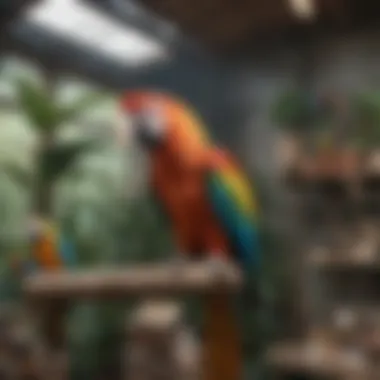
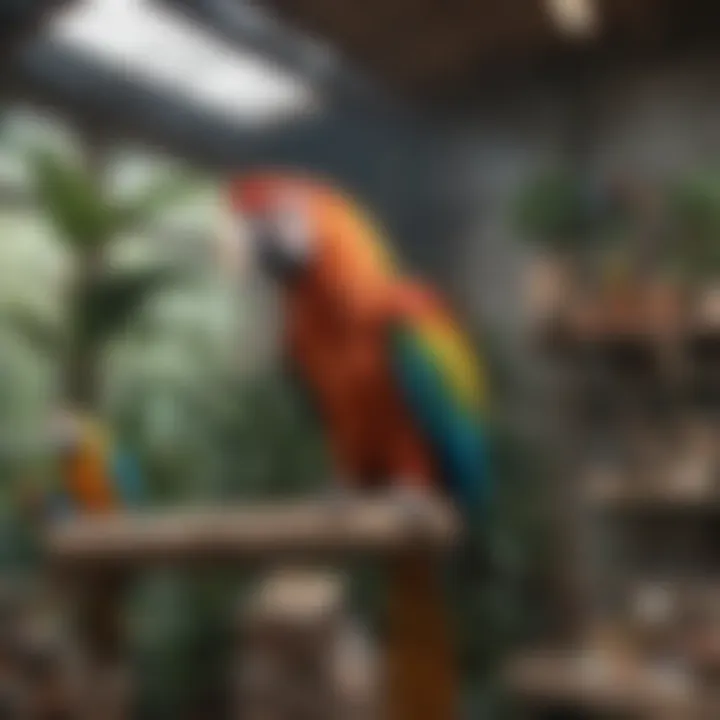
Selecting the proper habitat for a macaw is crucial to ensuring its well-being. The habitat influences not just their physical health but also their psychological state. An appropriate environment fosters a sense of security, stimulates mental engagement, and encourages natural behaviors. Understanding unique traits of macaws helps us appreciate why habitat is an essential consideration before bringing one home.
Cage Requirements and Layout
When picking a cage for a macaw, the first aspect to consider is size. Macaws are large birds, so ample space is necessary. A cage should ideally be at least 4 feet wide, 4 feet tall, and 3 feet deep, allowing them to move around comfortably. Keep in mind, wider cages foster more movement than tall ones.
The cage layout is also important. Arrange perches of various sizes and angles at different heights. This encourages natural behaviors such as climbing and exploring. Use non-toxic materials to build perches, such as dowels or natural branches of various widths to avoid foot problems.
Items like swings, ropes, and ladders keep macaws physically active and mentally stimulated. Avoid overcrowding the cage. Though macaws need items to interact with, make sure they have enough room to stretch and move without restrictions.
It's essential to regularly clean the cage and replace substrate materials to maintain hygiene and a healthy environment for your macaw.
Environmental Enrichment
Environmental enrichment plays a key role in enhancing the welfare of macaws. Boredom leads to unwanted behaviors such as screaming or feather plucking. To combat this, provide varied stimulation every day. Consider integrating toys, puzzles, and foraging opportunities into their habitat.
Offer toys designed for chewing and foraging. Birds naturally chew to keep their beaks healthy and to cope with boredom. Each plaything should be safe and made from non-toxic materials such as wood, sisal or untreated cloth. Rotate toys frequently to maintain interest, and observe which types of enrichment your macaw prefers over time.
Foraging for their food can also be a form of enrichment. Hide their food within their toys or spread it inside the cage for them to discover. Create foraging games that allow them to engage both physically and mentally. An engaging habitat doesn’t just meet needs but also nurtures their instinctual behaviors, making macaw ownership a rewarding experience.
Epilogue
Owning a macaw involves careful thinking about the habitat. From the suitable cage size to ample enrichment opportunities, these tasks ensure your macaw thrives. As stewards of such intelligent beings, it is our duty to create environments that emulate their natural habitats as closely as possible.
Nutrition for Macaws
Proper nutrition is crucial in the overall care of macaws. Their dietary requirements are complex and evolve with age, size, and specific needs. Ensuring that your macaw has a balanced diet supports both physical health and mental well-being. Since macaws are susceptible to obesity and certain diseases, understanding their nutritional needs is essential for promoting longevity and quality of life.
Moreover, a well-planned diet can enhance bonding between the macaw and the owner, as sharing meals becomes a form of interaction. Thus, attention to nutrition is not merely about feeding but creating an enriched environment conducive to the bird's flourishing.
Essential Dietary Components
A proper diet for macaws includes several essential components. Here are some key dietary elements:
- Pellets: High-quality commercial pellets should be the mainstay of a macaw’s diet. These pellets are formulated to contain the necessary vitamins and minerals.
- Fruits: Fresh fruits like apples, bananas, and berries provide natural sugars, hydration, and essential nutrients. However, they should be offered in moderation due to their sugar content.
- Vegetables: Leafy greens and a variety of colorful veggies like carrots, bell peppers, and sweet potatoes are vital. They offer fiber, vitamins, and antioxidants necessary for optimal health.
- Nuts and Seeds: These should be given as treats or supplements. While they offer good fats, overindulgence can lead to obesity. Hence, offer them sparingly.
- Protein Sources: Cooked legumes, eggs, and safe meats can serve as additional protein sources. Proteins are particularly vital for feather health and overall vigor.
Maintaining a diverse diet ensures that joins and inspections are preventable.
Common Dietary Mistakes
Many new macaw owners might inadvertently make common dietary mistakes. Here are some pitfalls to avoid:
- Overreliance on Seeds: Many people think seeds are enough, but they lack essential nutrients for macaws. They may also result in deficiencies if served as a primary food source.
- Ignoring Fresh Foods: Not incorporating fresh fruits and vegetables can lead to long-term health issues. These foods provide hydration and must be a regular aspect of the diet.
- Inconsistent Feeding: Some owners do not stick to a feeding schedule. Macaws do best under routine as they need stability in their daily feeding practices.
- Neglecting Balanced Diet: Failing to ensure variety may prevent the bird from receiving complete essential nutrients. With a varied diet, risk for deficiencies decreases substantially.
A balanced diet substantially increases the likelihood that your macaw will thrive in your care.
By being aware of these elements and potential mistakes, bird owners can cultivate a more effective feeding strategy. The impact of good nutrition on health is profound; it can lead to increased vitality, reduce health care costs, and even extend the macaw’s life span.
Health Maintenance
The health of a macaw is a critical element to ensure a long and fulfilling companionship. Proper health maintenance includes understanding both routine veterinary care and recognizing common illnesses. It resembles a framework of well-being, where each aspect plays a substantial role in enhancing the quality of life for these birds.
Regular health check-ups give macaw owners a sense of security. These birds, due to their unique metabolic and physiological characteristics, require specialized care. Routine veterinary visits are essential for monitoring their overall health. They allow for vaccinations, parasite checks, and dental care that help prevent potential health issues. Scheduled vet visits can lower the risk of chronic diseases and increase the longevity of your macaw.
Routine health care involves a few vital components, including access to an avian vet, nutritional assessments, and behavior evaluations. With early detection and preventive measures, many major health problems may be avoided.
Routine Veterinary Care
Taking your macaw to the vet should be part of your regular routine. Finding an avian vet—who specializes in birds—ensures that your macaw gets the best care. Such vets often provide valuable information regarding breeding, nutritional needs, and behavioral issues.
When you visit an avian vet, expect a comprehensive exam. This may include:
- Assessing the weight and plumage condition of the macaw.
- Checking for signs of infections or skin diseases.
- Examining the beak and nails for any signs necessitating trimming or care.
- Conducting tests for parasites or other hidden illnesses.
Utilizing such check-ups means you're proactivingy safeguarding your macaw from health problems. Maintaining a well-documented health history facilitates easy reference in future examinations.
Recognizing Common Illnesses
It is essential to also be informed about common illnesses that affect macaws. Potential health issues can be mildly nuanced yet serious when overlooked.
Some illnesses include:
- Psittacosis: A viral infection often characterized by respiratory problems and lethargy.
- Aspergillosis: A fungal infection that affects the lungs, which may show as breathing distress or weight loss.
- Feather Plucking: Behavioral issues that might indicate stress or boredom, leading to self-harm.
Awareness of the symptoms can significantly impact recovery. It is smart to monitor your macaw’s behavior as well as their eating habits. Any sudden changes may require immediate veterinary attention.
In summary, health maintenance of macaws is quite complex but ultimately essential. Having regular veterinary care helps catch symptoms that might not be easily noticed. Additionally, being prepared to recognize common illnesses empowers owners to nurture their birds effectively. Educating oneself on the health requirements of macaws promotes a rewarding and able relationship, yielding effective care and unmatched companionship.
Training Your Macaw
Training a macaw can significantly enhance the relationship between the bird and its owner. The process is not merely about enforcing discipline; it fosters communication and understanding. Proper training helps to curb unwanted behaviors, encourages mental stimulation, and offers the macaw emotional security. Investment in training leads to a more rewarding partnership.
In this section, we will discuss crucial aspects of training. Two key components are Basic Command Training and Behavior Modification Techniques. Each serves distinct purposes while collectively contributing to a harmonious environment.
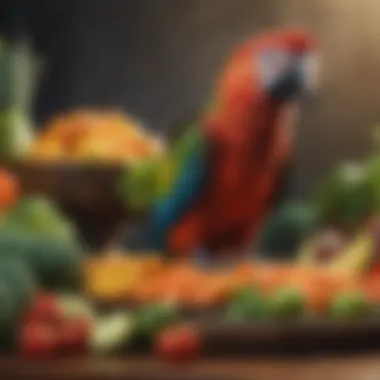
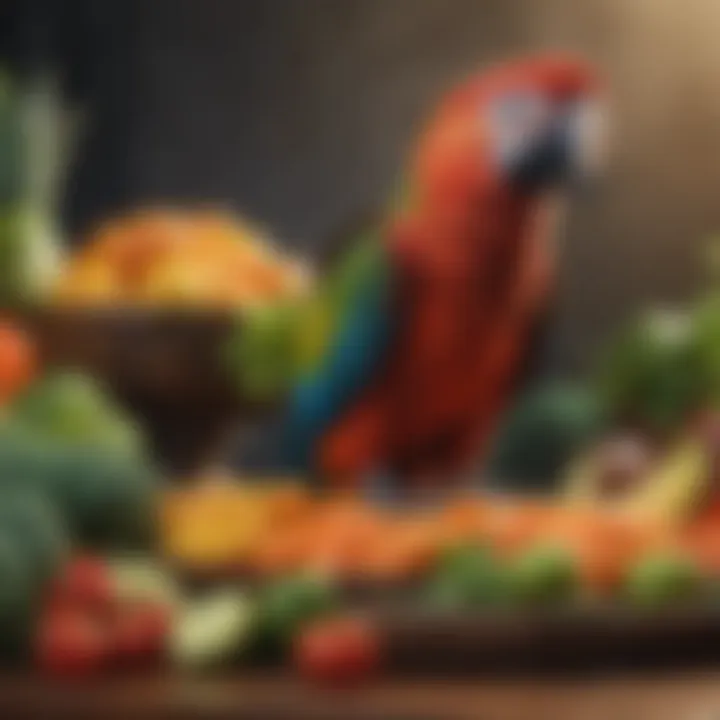
Basic Command Training
Basic command training provides a foundation for effective communication. Macaws are intelligent animals, capable of learning a variety of commands. This process begins with simple instructions like step up, step down, and come here. Using positive reinforcement tactics, such as verbal praise and treats, can incentive their cooperation.
Here are some effective strategies for basic command training:
- Consistency: Use the same commands consistently so that your macaw can easily associate the command with the desired action.
- Short Sessions: Keep training sessions brief. Aim for around ten to fifteen minutes to maintain their irritation and engagement.
- Patience: Understand that every macaw learns at a different pace. Avoid frustration if your bird doesn't grasp a command immediately.
- Positive Reinforcement: Reward any progress, even small achievements. This encourages your macaw to keep trying.
- Regular Practice: Integrate commands into daily interactions, making it a natural part of their routine.
With commitment and consistency, basic commands can be mastered. A well-trained macaw not only behaves better but also enhances the owner's experience and fosters trust.
Behavior Modification Techniques
Behavior modification is about addressing specific issues that may arise in macaw ownership. High intelligence can lead to challenging behaviors such as screaming, biting, or feather plucking. Addressing these problems requires tailored strategies. Understanding triggers is crucial. Consider what you might be doing that reinforces negative behaviors.
Methods for behavior modification include:
- Identifying Triggers: Pay attention to the situations that prompt undesirable actions. Sometimes, boredom or lack of stimulation plays a huge role.
- Redirecting Attention: If the macaw exhibits a troubling behavior, divert its focus toward a toy or a positive activity instead.
- Ignoring Negative Behavior: Sometimes, ignoring unwanted interactions can lead to their natural decline. This requires significant commitment from the owner.
- Providing Environmental enrichment: Introduce puzzles, swings, and interactive toys to maintain mental engagement and curb undesired behaviors.
- Consulting An Expert: In cases where techniques fall flat, consulting a professional animal behaviorist might be beneficial.
Understanding behavior modification techniques is vital for long-term companionship. They ensure that the macaw feels understood and secure in its environment.
Both segments of training highlight the personal effort needed to nurture a macaw. With perseverance and an open mind, owners can build a healthy, fulfilling relationship based on respect and understanding.
The Emotional Connection
The relationship between macaws and their owners is profound, shaped by layers of emotional connection. Understanding this bond is crucial, as it not only impacts the well-being of the bird but also enriches the owner's life. Macaws possess remarkable emotional intelligence, allowing them to experience a wide range of feelings. Recognizing and nurturing this emotional connection can lead to a fulfilling companionship.
Understanding Macaw Emotions
Macaws are capable of expressing joy, fear, affection, and even jealousy. They communicate their emotions through vocalizations, body language, and actions. Being sensitive creatures, macaws can easily pick up on the emotions of those around them. Owners may notice that their birds respond to feelings of happiness or sadness with corresponding behaviors. For instance, a happy owner might see their macaw engaging in playful antics, while a distressed owner may witness their macaw displaying signs of anxiety, such as excessive screeching or feather plucking.
Related studies suggest that establishing an emotional bond with a macaw enhances their ability to learn and adapt. In addition to companionship, this bond fosters a sense of security. Macaws that feel secure in their environment are less likely to exhibit behavioral issues. The emotional connection is ultimately vital for both owner satisfaction and the bird's overall mental health.
Bonding Activities
Bonding with a macaw involves engaging them in activities that fulfill their need for interaction and mental stimulation. Here are some ideas for fostering this crucial bond:
- Meal Preparation: Involve your macaw in meal times. Hand-feeding fresh fruits or veggies, allows for direct interaction and trust-building.
- Training Sessions: Regular training not only stimulates the bird's mind but also fosters communication between parent and bird. Teaching simple commands can be both fun and enriching.
- Playtime: Devote consistent time to play with toys, climbing structures, or even simple games like hide and seek. Macaws are intelligent and will enjoy engaging with their surroundings.
- Social Exposure: Enrich their social life by introducing varied settings, other people, and even social play with other birds. Exposure can build confidence which is vital for emotional growth.
Regularly engaging in these activities not only strengthens the emotional connection but also enhances the quality of life for both owner and macaw. The bond formed contributes to the shared experience of longevity, comfort, and emotional fulfillment, reinforcing the importance of nurturing this relationship throughout the years.
Bonding with your macaw is an investment in an emotionally rewarding journey. By understanding their needs and emotions, you can create not just a pet relationship, but a lifelong partnership.
Challenges of Macaw Ownership
Owning a macaw presents unique challenges that often require careful consideration before committing to the responsibility. Understanding these challenges is crucial not only for the well-being of the bird but also for fostering a meaningful relationship between the macaw and its owner. Several key elements emerge in this discussion, which includes time commitment, lifestyle changes, and cost management. Recognizing the implications of these factors can easy lead to more successful outcomes in both avian care and bonding.
Time Commitment and Lifestyle Adjustments
Macaws are not mere pets; they require an investment in both time and lifestyle adjustments. They are social creatures and thrive in interactive environments. Daily engagement is crucial, as neglect can lead to behavioral issues. Owners must dedicate a considerable amount of time each day to interact with their macaw. This interaction can take various forms: playtime, training, or simple conversation. The need for companionship makes macaws less suitable for individuals with excessively busy schedules.
Changes in one’s lifestyle might be needed. Pet owners may need to rethink travel plans or social outings. For example, if going on vacation, arrangements will need to be made well in advance. Caregiver services for macaws may not be in plentiful supply.
In short, planning social and professional activities in a way that accommodates the macaw's needs is essential. Failing to do so may result in stress for both the bird and the owner.
Cost Considerations
Financial investment is another critical aspect of macaw ownership that cannot be overlooked. Prices may vary greatly depending on the macaw species chosen. Initial costs often include the price of the bird, which can range from a few hundred to several thousand dollars. Upfront expenses do not end there. Cage purchase is critical and should not be shortchanged; a proper cage can range from a few hundred to over one thousand dollars. Additionally, costs for quality food, toys, and supplies are substantial. These elements play a key role in ensuring the macaw's short-term and long-term well-being.
Routine veterinary care adds another layer to the financial commitment. Registering with an avian veterinarian may require a premium. Preventative healthcare, including vaccinations and regular check-ups, ensures early detection of issues, which can be more cost-effective over time.
Owning a macaw is often rich in rewarding experiences, but its challenges can greatly affect an owner’s quality of life and preparation.
A well-cared-for macaw can live for 50 years or more; a significant commitment for any owner.
By carefully evaluating both the time and financial commitments involved in macaw ownership, prospective owners can create a fulfilling companionship that offers success for both human and avian partners.
The Lifespan of Macaws
Understanding the lifespan of macaws is quite crucial for prospective owners. Given the commitment involved in caring for these birds, recognizing their longevity helps to inform responsible pet ownership. Macaws are remarkable creatures that can live for extended periods, often exceeding forty years. The implications of this fact are significant, not only regarding day-to-day care but also in long-term planning for a pet.
Understanding Longevity
Longevity in macaws stems from a variety of factors including genetics, diet, and overall care. Generally, macaw species are known for their long lives; some species like the Hyacinth Macaw can live up to 75 years in optimal conditions.
Many aspects influence the lifespan of macaws:
- Diet: A well-balanced diet comprising fruits, vegetables, nuts, and high-quality pellets plays a vital role. Nutritional deficiencies can lead to severe health issues that may shorten a macaw's life.
- Environment: An enriching environment that emulates their natural habitat can promote both physical and mental health. Spacious cages, toys, and social interactions are necessary.
- Veterinary Care: Regular check-ups with an avian vet are imperative. Prevention is better than treatment when it comes to ensuring their health Won't you utilize availalbe vaccinations and health screenings crucial? Frequent observation for any atypical behavior or eating habits can also aid in catching potential issues early.
Preparing for the Future
Preparing for the future with your macaw involves more than caring for its immediate needs. Considerations include long-term care and even what will happen during major life changes. Owners must be aware ready for the potential reality of their macaw's lengthy stay.
Here are some proactive measures to take:
- Adoption Plans: Macaws can outlive their owners, so thinking about future care is essential. This may include arrangements with family members or ensuring a trusted individual is knowledgeable about macaws.
- Financial Planning: Owning such a long-lived bird demands budget considerations. Ensure financial resources are avivable particularly because of their needs. Ongoing supplies state-of-the-art which includes healthcare will require sustained investment over decades.
- Long-Term Rentals and Traveling: Make arrangements in advance for those times when you're away or may relocate; ensure you can find accommodations that cater to your macaw’s needs, reducing stress for yourself and for your pet.
“Planning for your macaw's future is crucial; be proactive to avoid unexpected surprises.”
Being prepared for a pet's longevity gives owners peace of mind. With thoughtful consideration and planning, you're better equipped not only for your macaw's life but for nurturing a profound and lasting companionship.















